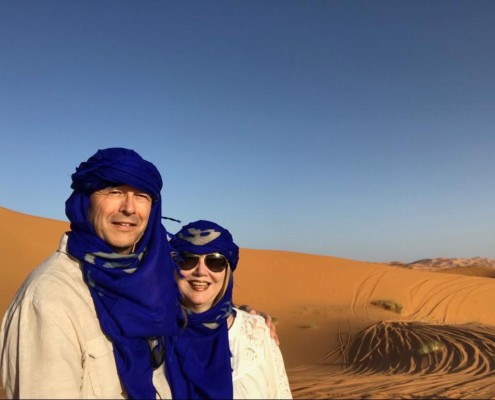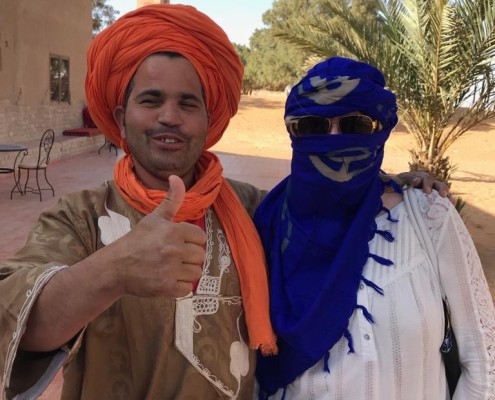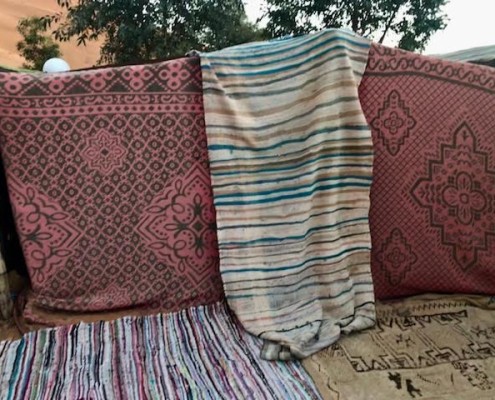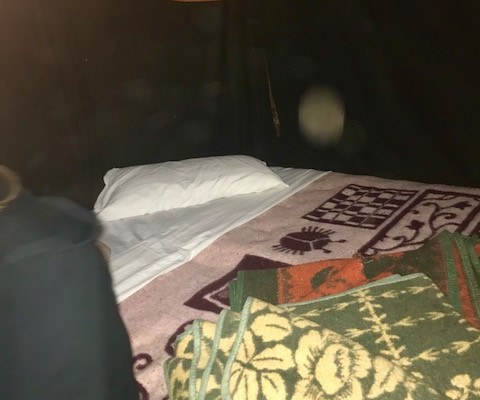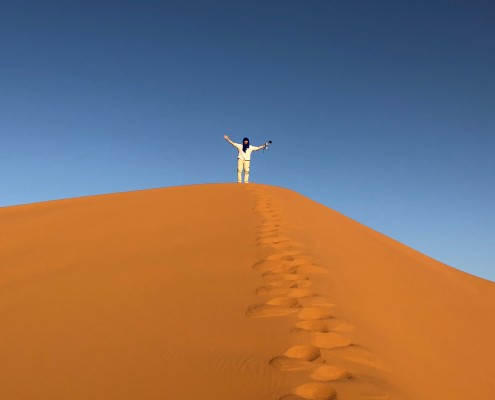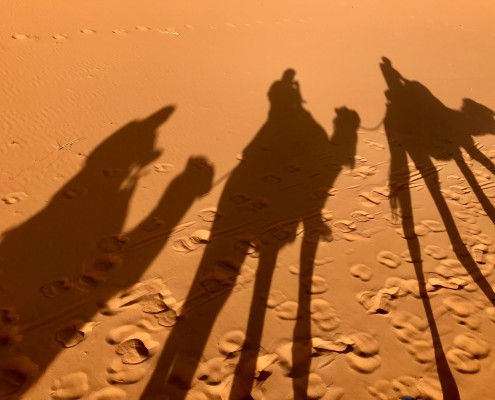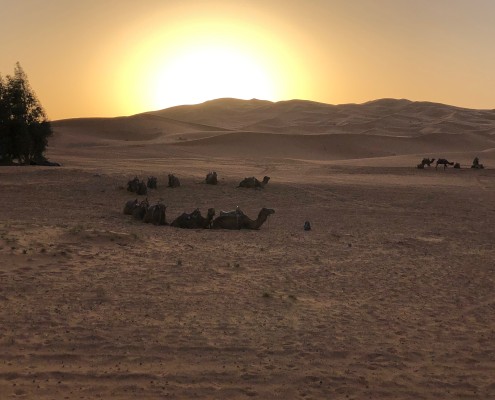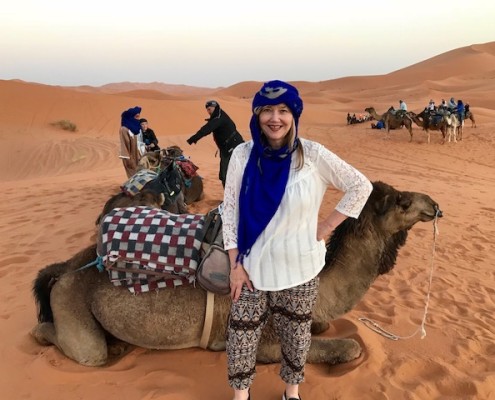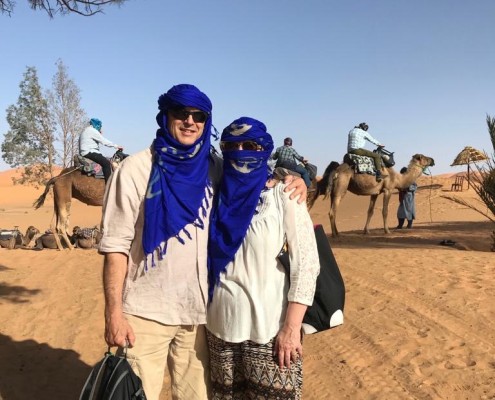Morocco I
Hello Everyone, Sahara Desert, Morocco
Our three-week adventure in Morocco has come to an end. We are home now, but there is still much we as believers can do to impact that nation. Your prayers are definitely needed.
To begin with our adventure in the Sahara entailed a 3 hour camel ride into the desert where we camped out in Berber tents. I have to admit Bruce and I were a bit sore the next few days. I can’t even imagine how the Magi journeyed so far and so long to attend Jesus’ birth. Let’s just say that even though it’s a small-scale view, I have a somewhat up close and personal understanding of what they might have endured.
However, sharing with our new Berber friends was indeed a highlight of our trip. The Berbers are an unreached people group and have weighed heavily on our hearts since we first learned of them 10 years ago in our Perspectives course. It’s truly amazing how God opened the doors all throughout the trip so that we might have personal encounters with Berbers. How faithful is He in answering our prayers! So who are the Berbers of the Sahara?
The Sahara, with 3.5 million square miles, is the largest “hot” desert in the world. The Berbers appeared on the scene at the dawn of the Sahara’s history. They are the original inhabitants of North Africa and occupied the region long before the arrival of the Arabs who brought with them their language, Arabic, and their religion, Islam,
The lowland desert Berbers are generally nomadic. Small groups consisting of medium or large extended families are found all across the Sahara. Desert Berbers live a very different lifestyle compared to their mountain brethren. Being nomadic, they move constantly across national borders. International boundary laws mean little to them as they follow the natural seasonal cycle of grazing, water and shelter. These people are born to move under the open sky and across unlimited horizons with their flocks of sheep, goats, and camels. Their wandering nomadic lifestyle is central to their way of life. Families subsist on goat milk, bread, dates, barley, couscous, mint tea, and butchered sheep, goats and sometimes camels. Their timetable is according to the sun, moon and the rare occurrence of rain.
In the Old Testament you get the impression that God has a special interest in those who wander around in deserts looking after their animals. It is not just the experience of Abraham after God called him and his family out of the advanced city of Ur. Right from the beginning of Genesis, the Book of Beginnings, it appears as if the nomadic experience was God’s preferred way of life for all peoples.
It isn’t so much that God favors nomads, but it appears that he is able to speak to men and women much more easily in desert places than in the hustle and bustle of the city. In the desert, it is impossible to ignore God; in fact, I doubt that you will ever meet a nomad who does not have a high view of a God who sends rain, abundance, and health. Notwithstanding, they may still spend much of their time and money trying to appease the bad gods, demons, or jinns (as they are referred to by Muslims), or by trying to escape the curses of enemies. And they might not have heard yet of the power of the Lord Jesus, the one who has defeated all these evil forces, and who can bring them to the good God. It is because of the saving power of Jesus that Christianity is so relevant to nomads. If we are prepared to enter their world of relationships, it will require we prioritize people over buildings, projects and programs. The other great advantage to entering their world is the nomadic emphasis on hospitality—when you bow your head and enter the tent, you are welcomed to stay. This common depiction of nomadic hospitality appears in Genesis 18:1–8 when “Abraham was sitting at the door of his tent in the heat of the day.” Despite the heat, when “he saw three men standing nearby he hurried to meet them and bowed low to the ground.” His gracious salutation and invitation to rest under a tree while water was brought to wash their feet are all normal traditions in most nomadic societies. Abraham’s seemingly minimal offer to get them something to eat led to great efforts on the part of his wife and servants to bake bread and to kill and cook a choice calf from the herd. Much later would come the generous feast of curds and milk and well-cooked calf veal, which anyone familiar with nomadic hospitality will appreciate.
The middle chapters of the book of Genesis (chapters 23–37) are extremely interesting to most nomadic people, as they can so readily identify with the experiences of the patriarchs Abraham, Isaac, and Jacob. Whether they are literate or not, all nomads are oral learners and they love stories, especially those that feature animals, deserts, and wells. However, very few nomadic peoples take much trouble to bury their wives or even remember them. That is why the story of the death and burial of Sarah is so impressive to nomadic people.
Even more interesting to nomads who have camels is the story where Abraham sends his trusted chief servant, Eliezer, to get a wife for his son Isaac. Eliezer had ten camels and many valuable gifts and clothes to carry and protect. The most fascinating part of this story is when the caravan arrives at the precise well where God’s chosen wife for Isaac would make her appearance. As a shepherdess, she came to get water for her sheep. Even more impressive to a camel herder is the offer that Rebekah made to Eliezer: she did not just give him water to drink, but also drew water for his camels until they had finished drinking. If his camels had traveled for ten days, as seems likely given the distance to Haran, they each would drink about thirty gallons of water. The scripture says explicitly that the camels did drink all they wanted “until they were finished.” The ten camels could have consumed as much as three hundred gallons of water—about three thousand pounds. The scripture also says that she quickly emptied her jar into the trough and ran back to the well to draw more water, and drew enough for all his camels. (Gen. 24:20)
It is no wonder that Eliezer was impressed with this young lady, who was also described as “very beautiful.” Her quickness was necessary since a camel can drink those thirty gallons in seven minutes!
This story is so impressive that it is recorded twice in this chapter, as Eliezer recounts it again for Rebekah’s family that night in their house where they were offered true nomad hospitality. Finally, the fact that deserts continue to have an important purpose in the development of strong leaders in the New Testament as well as the Old Testament brings us again to a certain conclusion: it’s not a nomadic lifestyle that is so valuable in learning about the nature and power of God, as it is the outcome of having lived a nomadic existence in the desert. That is where the rigors of daily survival concentrate the attention on the grandeur of empty space and the immensity of the heavens at night. This is presumably why certain key figures in the New Testament were sent into a desert or chose to spend time there in solitude. John the Baptist, Jesus himself, and the apostle Paul found the desert a threshold for new ministry.
Examples throughout the Bible indicate that we are meant to be a pilgrim people, traveling lightly through what is still a beautiful world, but alien to us in its present unredeemed state. We are pilgrims moving to a wonderful and assured destiny, but on the way there, as long as we are on the earth, we want to be available to do the work of Him who sent us.
Please pray for the Berbers of the Sahara; nomads surrounded by vast empty space and under the immense heavens of a loving Father.
May they see the face of Jesus and may their hearts be open to Him.
Father break our hearts for your lost people.
May we keep our eyes fixed on You alone.
May we live as pilgrim people, traveling lightly through this world.
May we walk as does the nomad.
Blessings,
Karen and Bruce Schagunn


